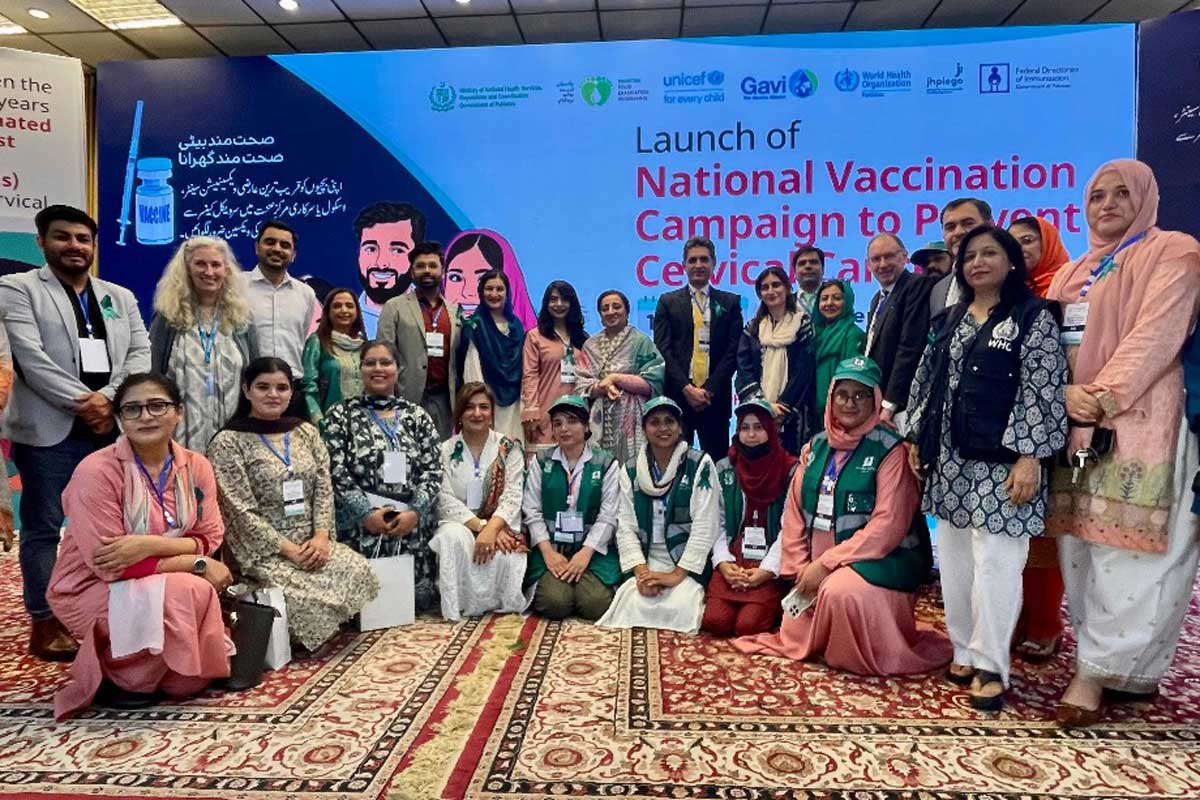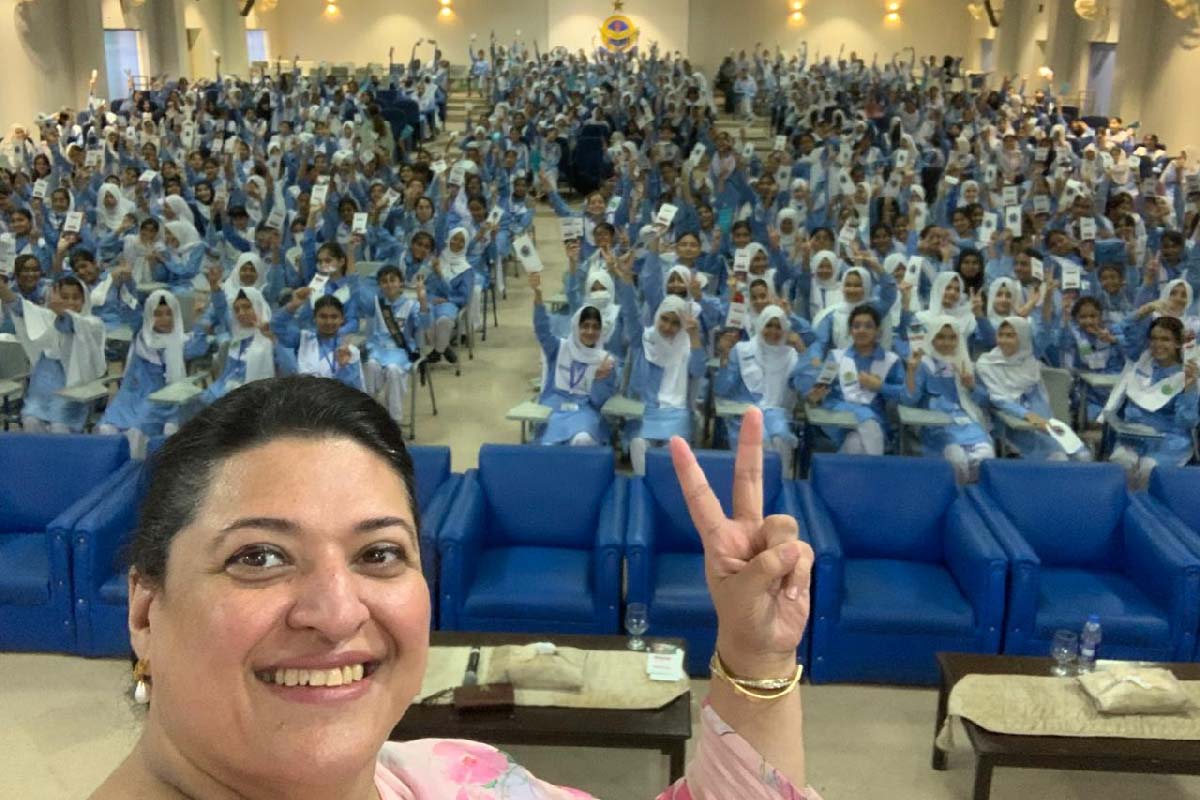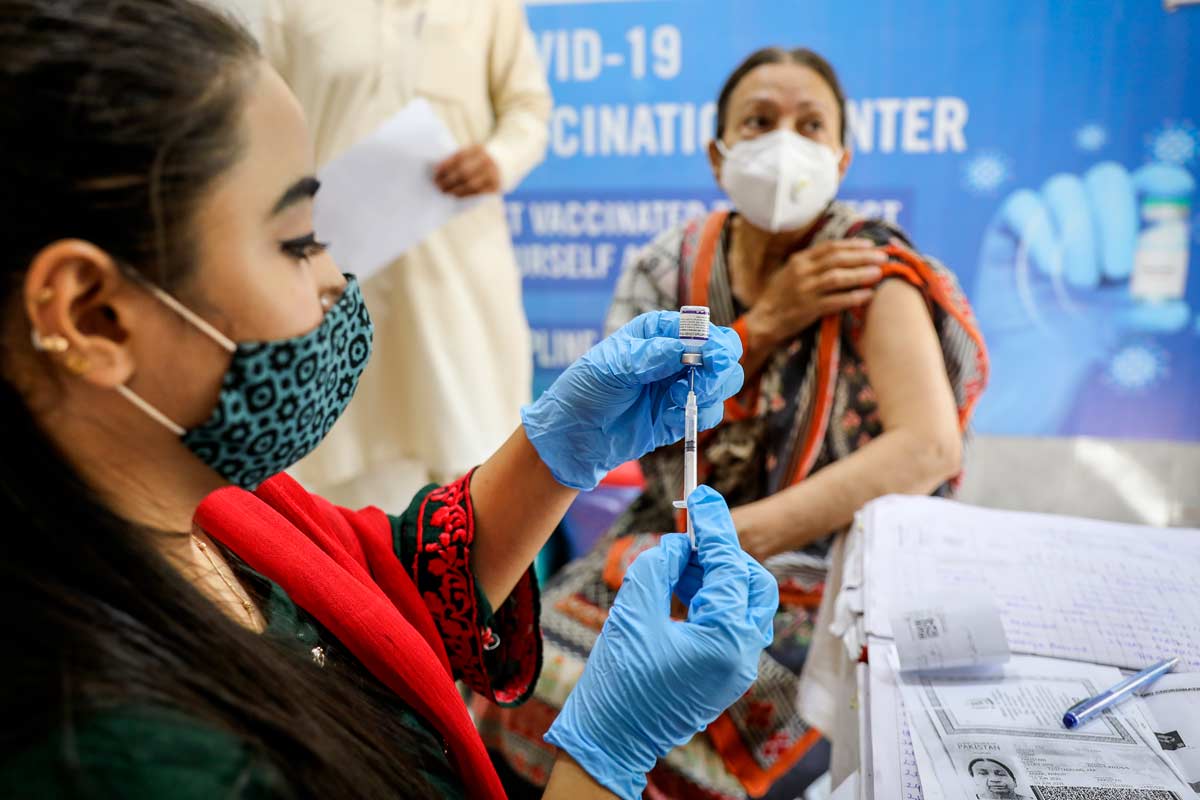A turning point for women’s health in Pakistan
Starting this week, the nation's daughters will be shielded from a brutal and preventable disease, and we’re glad to play our part in the campaign.
- 17 September 2025
- 7 min read
- by Areej Javed

Every girl deserves the chance to grow up healthy, safe, and free from the shadow of a preventable disease. In Pakistan, cervical cancer ranks as the second most common cancer among women of reproductive age. About 5,000 new cases and more than 3,000 deaths from the disease are reported each year, though the actual burden is likely to be higher.
The World Health Organization (WHO) has set out a global strategy to eliminate cervical cancer by 2030, and around 150 countries worldwide, including many low- and middle-income countries, have already made progress through national vaccination programmes against the human papillomavirus (HPV) which is the underlying cause of the vast majority of cases of cervical cancer.
This week, Pakistan joined them, launching the first wave of its nationwide, public HPV vaccination campaign.
A historic campaign
Between 15 and 27 September 2025, more than 13 million girls aged 9 to 14 across Punjab, Sindh, Islamabad, and Azad Jammu and Kashmir will be eligible to benefit from a life-saving vaccine that can protect them from future cervical cancer. The nationwide roll-out, slated to expand to 3.2 million more girls in Khyber Pakhtunkhwa in 2026, and to 1.4 million girls in Balochistan and Gilgit-Baltistan in 2027, is a collective statement that the country will no longer accept deaths from a disease from which nobody needs to suffer.
A collective responsibility
“I view this not just as a campaign, but as a national responsibility. Together, we can ensure that no girl in Pakistan is left vulnerable to a cancer we have the means to prevent, and that begins with your continued support, inside and outside your clinics,” said Dr Soofia Yunus, Director General, Federal Directorate of Immunization (FDI), speaking at an FDI and Foundation University of Health Sciences Seminar on Cervical Cancer Free Pakistan.
“This nationwide HPV vaccination campaign marks a turning point for women’s health in Pakistan,” said Dr Aminah Khan, Country Director, Jhpiego Pakistan. “By introducing a life-saving vaccine and embedding it into the national immunisation system, we are acting on the best global evidence to prevent thousands of avoidable cases of cervical cancer in the decades to come.”
Building trust while thwarting myths and misconceptions
Successfully launching a vaccine is all about trust and understanding. In preparation, Jhpiego led a nationwide Knowledge, Attitudes and Behaviours (KAB) survey, reaching 4,682 caregivers of girls aged 9–14 in every province and region across the country.
Our findings were sobering. Only 19% of caregivers had even heard of cervical cancer. Just 5% had heard of HPV, and a mere 2% knew there was a vaccine that could prevent it. Among those who had heard of cervical cancer, misconceptions ran deep: 32% percent blamed poor hygiene, 19% believed it spreads from mother to child, and 20% percent thought unsafe sexual practices were to blame; only 9% correctly named HPV infection as the cause.
Even among the small group familiar with HPV, 64% knew it leads to cervical cancer, yet half mistakenly believed there is a cure.
And there were some interesting differences, province to province, in popular understandings of the cancer and its causes. These are insights that can now shape communication strategies: addressing misconceptions and strengthening vaccine confidence will bolster the reach of the campaign.
“These findings are a wake-up call. With awareness of HPV so low, our priority is to build trust and address misconceptions through clear, evidence-based communication. This data guides us in shaping messages and partnerships that give every parent the confidence to protect their daughters against cervical cancer,” says Dilbar Khan, Project Lead, Jhpiego.
Strong partnerships and collaboration are critical for success
To make sure every girl can get protected, a broad church of partners – the Ministry of National Health Services, Regulations and Coordination, The FDI, provincial health departments, Jhpiego, Gavi, WHO, UNICEF, and partners – have helped design an inclusive service delivery model. Vaccines will be administered in a variety of locations: schools, fixed Expanded Programme on Immunization (EPI) centres, temporary outreach sites in villages and urban settlements. And girls who might still otherwise be left out will be reached by mobile teams.
Only 19% of caregivers had even heard of cervical cancer. Just 5% had heard of HPV, and a mere 2% knew there was a vaccine that could prevent it.
Behind those teams is a carefully trained network of vaccinators, assistants, and social mobilisers – Lady Health Workers, community volunteers, and local leaders – each ready to ensure the vaccine is well-handled, the cold chain is maintained and no eligible girl is missed.
“With timely vaccination, we can protect millions of girls before they are ever exposed to the virus, before the disease can take hold. But for this vision to become a reality, every one of us must play a role. We (the parents, doctors, religious leaders, lawyers, teachers, students, journalists, health forums, CSOs, NGOs, government inline departments and people from other walks of life) collectively must play our role to open doors for our daughters to a healthy future, free from fear and disease,” said Dr Khurram Shahzad, Director Technical at FDI.
Engaging influencers and opinion shapers to support the campaign
Recognising that information is as critical to a successful vaccine introduction as infrastructure, Jhpiego has also been investing in the people who shape public opinion.
Teachers across Sindh and Punjab were among the first we reached out to. Together with provincial health leaders, civil society organisations (CSOs) and partner agencies, they learned how best to counter myths with culturally sensitive messages and to ensure that girls – whether in school or out – were reached.
CSOs have been prepared through a first-of-its-kind national orientation program: they’ve been equipped with dynamic manuals and simulation exercises to help them to both mobilise communities and sustain demand for the vaccine well beyond the initial campaign, as well as document their outreach work.
We also conducted a nationwide series of briefings for journalists from print, television, and digital outlets. Disease and vaccination are highly technical subjects, and the media needs to be well-informed to be capable of reporting responsibly.
These sessions not only built understanding of the HPV vaccine’s life-saving potential, but also strengthened journalists’ capacity to assess and parry myths and misinformation. By fostering open dialogue between health experts and the press, the initiative helped ensure that accurate, evidence-based and timely information reached families in every community.
An animated explainer video for all
Jhpiego also launched Pakistan’s first-ever animated awareness video on the human papillomavirus (HPV) vaccine, a user-friendly means of making life-saving information available to the people who need it. The video takes viewers through the vital basics: how HPV spreads, why vaccination matters, and that the evidence tells us that the HPV vaccine is a safe, effective solution for protecting future generations.
“The big risk is that in a knowledge vacuum, misinformation or simple confusion can grow and reduce families’ confidence in a vaccine that we know from hundreds of millions of doses given worldwide, is truly very safe and effective. I am pleased that the communication materials Jhpiego is supporting start with education on the cancer, its screening and treatment, as well as giving critically important advice on vaccination,” says Chris Morgan, Technical Director, Immunization, Jhpiego.
Building a coalition of trust
From classrooms to community halls, from newsrooms to the smallest rural clinics, this campaign is building a coalition of trust. It is a movement that combines evidence and empathy, planning and passion. And it is a promise, to our daughters and to the generations to follow, that Pakistan will protect women from a disease we can prevent.
Reaching 13 million girls in two weeks is a task we know will challenge the provincial immunisation programmes, but our work over the last many months has shown us the programmes leading the charge have the commitment to persevere.
We’ve also seen that the magnitude of work to build trust, bridge the knowledge gap and counter misinformation is considerable. But Pakistan has a broad alliance of partners committed to overcoming these challenges.
By uniting government leadership, global partners, educators, civil society, professional and medical associations, and the media, and by grounding every decision in data and dialogue, The Ministry of National Health Services, Regulations and Coordination, the FDI, provincial health departments, Jhpiego, Gavi, WHO, UNICEF, and partners are helping Pakistan take a decisive step toward WHO’s 2030 goal of eliminating cervical cancer as a public health threat.
Equally important will be sustaining this progress by embedding HPV vaccination into routine immunisation, and ensuring that protection extends to all eligible girls in the years ahead.







